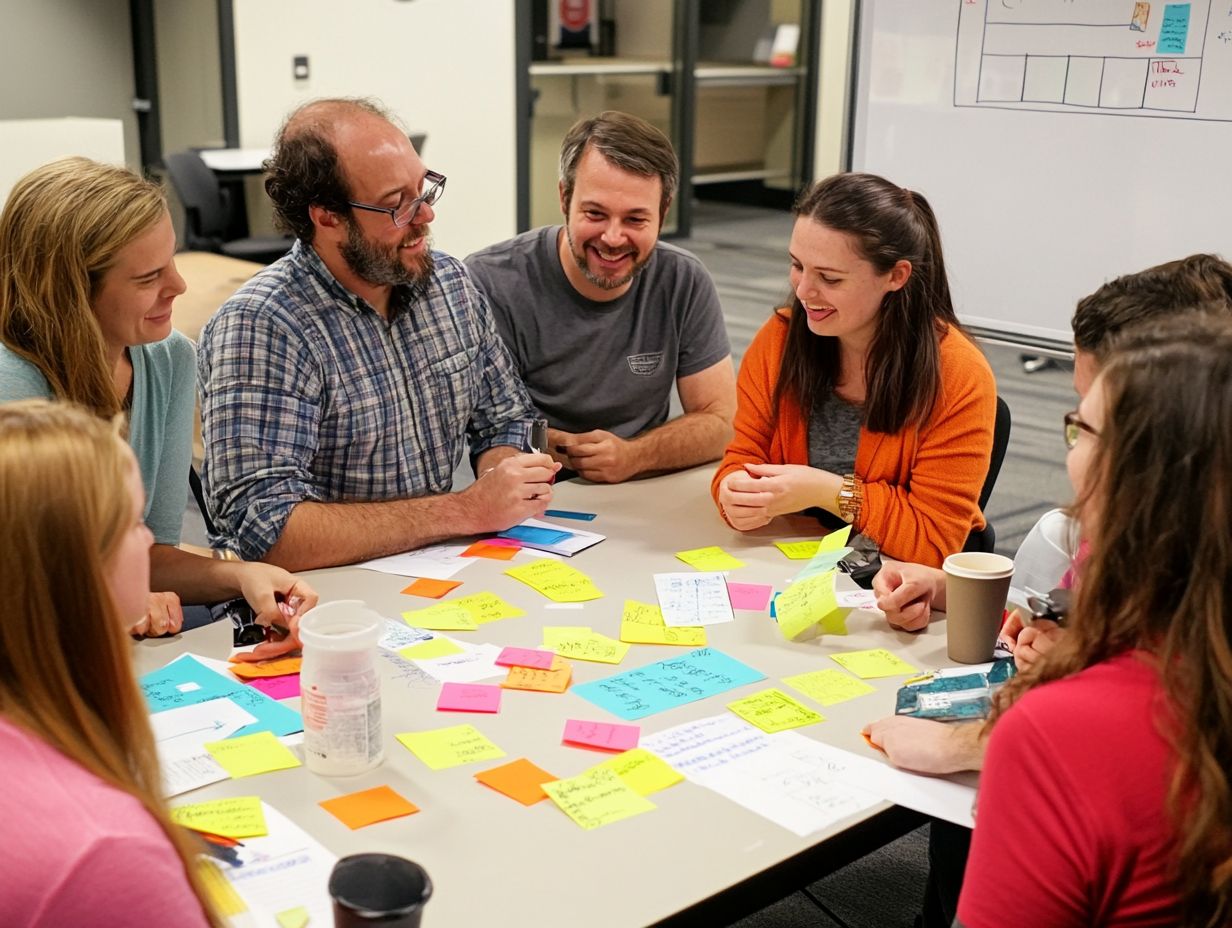Creating SMART Goals for Volunteer Work
Setting goals for your volunteer work can transform your impact and drive success! This discussion delves into the significance of SMART goals Specific, Measurable, Achievable, Relevant, and Time-bound and how they can amplify your contributions and drive organizational success.
You’ll find a step-by-step guide for crafting these goals, complete with real-life examples and tips to keep your motivation high. Whether you’re a seasoned volunteer or just starting out, this guide will empower you to ensure your efforts truly make a difference.
Contents
- Key Takeaways:
- What are SMART Goals?
- The Importance of Setting Goals for Volunteer Work
- How to Create SMART Goals for Volunteer Work
- Examples of SMART Goals for Volunteer Work
- Tips for Achieving Your Volunteer Goals
- Frequently Asked Questions
- What are SMART goals and why are they important for volunteer work?
- How can I create SMART goals for volunteer work?
- What are some examples of SMART goals for volunteer work?
- How do I stay motivated to achieve my SMART goals for volunteer work?
- What should I do if I am struggling to meet my SMART goals for volunteer work?
- Can I modify my SMART goals for volunteer work if necessary?
Key Takeaways:

- Set specific, measurable, achievable, relevant, and time-bound (SMART) goals for volunteer work to increase your chances of success.
- Don’t miss out on the powerful benefits of SMART goals for both volunteers and organizations get started today!
- Use a step-by-step guide and real-life examples to create SMART goals for volunteer work that are realistic and measurable.
What are SMART Goals?
SMART goals are a highly regarded methodology that you can leverage to refine your goal-setting process and measure success with precision. The acronym SMART stands for Specific, Measurable, Achievable, Relevant, and Time-bound.
This framework enables organizations, much like Meals on Wheels or those dedicated to supporting underprivileged youth, to articulate their objectives clearly and monitor their progress toward meaningful community impact. By adopting this approach, you ensure that every effort is aligned with the overarching mission and effectively engages stakeholders.
The Importance of Setting Goals for Volunteer Work
Setting goals for your volunteer work is essential for nonprofit organizations, as it establishes a solid foundation for effective volunteer management and amplifies your community outreach efforts. Defining clear fundraising goals helps you allocate resources more efficiently and engage volunteers meaningfully.
Moreover, you can cultivate a robust board structure that actively supports these initiatives.
Benefits for Volunteers and Organizations
You and your nonprofit organization stand to gain immensely from effective goal setting, which enhances the volunteer experience and amplifies your community impact. By implementing well-structured training programs and systems that help measure progress and success, you can ensure that your volunteers feel valued, engaged, and equipped to make meaningful contributions to your mission.
When you set clear and achievable objectives, you motivate your volunteers and build a sense of ownership and commitment to the cause. This structured approach can significantly improve your recruitment outcomes, attracting potential volunteers to your organization as they are drawn to your clear vision and purpose.
As your volunteers witness the tangible results of their efforts through organized goal achievement, their satisfaction levels will soar, leading to higher retention rates. With their ongoing engagement, the potential for deeper community ties expands, creating a ripple effect that enhances both your organization s success and its overall impact in the community.
How to Create SMART Goals for Volunteer Work

Crafting SMART goals for your volunteer work requires a careful and strategic approach that aligns seamlessly with your nonprofit organization’s mission. By leveraging tools like a volunteer database, you can pinpoint funding opportunities and establish clear, achievable objectives that guide your initiatives effectively.
This thoughtful planning not only improves resource allocation but also enables your team to make a meaningful impact.
Step-by-Step Guide
Streamline the goal-setting process for volunteer work into clear steps that ensure measurable outcomes while aligning with your organization’s mission. By adopting a structured approach, including volunteer management software and precise metrics tracking, you can establish achievement milestones and training objectives that pave the way for success.
-
Define specific, actionable goals that resonate with your organization’s priorities. For example, if your aim is to boost community engagement, set a target for recruiting a specific number of volunteers within a designated time frame.
-
Select the right tools for tracking progress. Software solutions can offer dashboards that visualize metrics over time, making it easier for you to adjust as needed.
-
Regular evaluations are essential for analyzing whether your training objectives align with these goals. This practice allows you to fine-tune strategies, enhance volunteer satisfaction, and ensure your efforts yield the desired impact.
Examples of SMART Goals for Volunteer Work
SMART goals for volunteer work provide a clear framework to establish realistic and measurable objectives that resonate with your organization s mission. These examples illustrate how effective goal setting can enhance your volunteer recruitment strategies, unlock funding opportunities, and support broader organizational ambitions.
Realistic and Measurable Goals
Formulating realistic and measurable goals is crucial for ensuring volunteer engagement and retention in nonprofit organizations. By establishing clear metrics and effective engagement strategies, you can assess your community impact and make data-informed decisions.
Setting these goals provides a roadmap for your organization and nurtures an environment where volunteers feel valued and motivated. For example, aim to increase volunteer hours by 20% over the next quarter. Track your progress with specific metrics, such as the number of hours logged online or the frequency of volunteer-led initiatives.
Conducting regular surveys helps gauge volunteer satisfaction and identify areas for improvement, fostering a cycle of continuous growth. Understanding and applying these principles better aligns your mission with actionable objectives, enhancing both the volunteer experience and your organization s overall effectiveness.
Tips for Achieving Your Volunteer Goals

Achieving your volunteer goals demands various strategies that enrich the volunteer experience and adeptly navigate challenges.
Prioritize effective internal communications and nurture strong donor engagement to cultivate a supportive environment for success.
Staying Motivated and Overcoming Challenges
Staying motivated amid challenges is vital for you and your nonprofit organization as you strive to achieve your goals. Implement effective motivation strategies and actively seek input from stakeholders to adapt to policy changes and improve volunteer retention.
Create tailored recognition programs to celebrate your volunteers’ achievements. Offering professional development opportunities that align with their skills and aspirations can also be highly beneficial.
Fostering open dialogue with community members helps you better understand their needs and expectations. Make adjustments that resonate with both your volunteers and beneficiaries. When volunteers feel their voices matter in decision-making, they re more likely to stay engaged, building a stronger and more resilient support network essential for navigating challenges.
This collaborative approach boosts morale and fortifies your organization s overall mission. We encourage you to share your thoughts and suggestions to promote an inclusive atmosphere.
Frequently Asked Questions
What are SMART goals and why are they important for volunteer work?
SMART goals are specific, measurable, achievable, relevant, and time-bound objectives that help volunteers to stay organized. They focus on tasks and provide structure and clarity, making it easier to track progress and achieve success.
How can I create SMART goals for volunteer work?

The first step is to identify your specific goal. Next, define how you will measure success with clear targets. Then, ensure the goal is relevant to your volunteer work. Lastly, set a realistic timeline to achieve your goal.
What are some examples of SMART goals for volunteer work?
A SMART goal for volunteer work could be: “To recruit and train 20 new volunteers for our organization by the end of this month, increasing our impact in the community.” Another example could be: “To raise $5000 through fundraising events within the next 3 months to support our cause.” For more insights, consider using SMART goals for team success.
How do I stay motivated to achieve my SMART goals for volunteer work?
One way to stay motivated is to regularly review and track your progress. Celebrate your small wins! They fuel your motivation. Sharing your goals with others helps keep you accountable.
What should I do if I am struggling to meet my SMART goals for volunteer work?
If you find yourself struggling to meet your goals, try breaking them down into smaller, more manageable tasks. Re-evaluate your goal to ensure it is achievable and relevant. Reach out to fellow volunteers or your supervisor for support. They can offer valuable guidance!
Can I modify my SMART goals for volunteer work if necessary?
Yes, it is important to be flexible and adapt your goals as needed. If unexpected challenges arise in your volunteer work, it’s okay to modify your goals to better align with the current situation. Just make sure to re-evaluate and update your goals accordingly.






